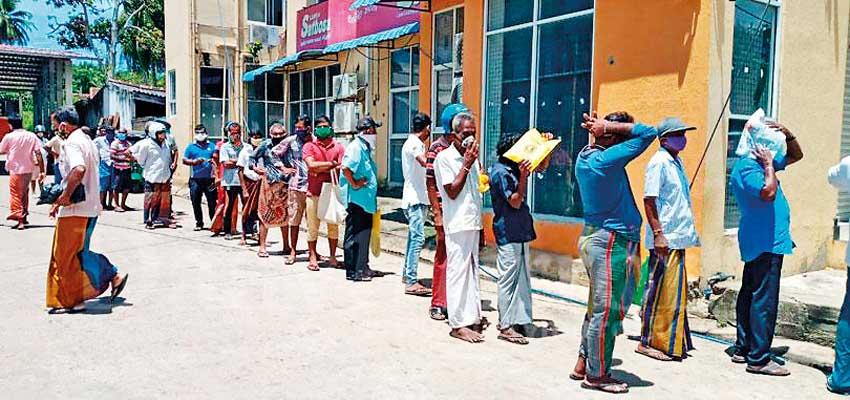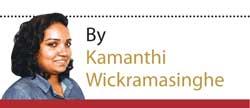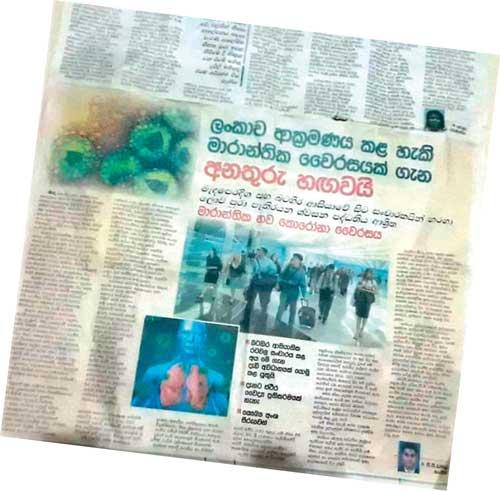Reply To:
Name - Reply Comment

 When Dr. Chamal Sanjeewa, Registrar in Medical Administration, Postgraduate Institute of Medicine at Colombo University predicted a possible outbreak of a novel coronavirus back in 2013, neither the authorities nor the public gave much attention. The article was first published in a Sinhala newspaper during the Middle East Respiratory Syndrome (MERS) outbreak in certain other parts of the world. In the article he warns that Sri Lanka too might be affected by this new type of virus and at the time the article was written he was serving as a Medical Officer at Karapitiya Teaching Hospital. “All what I said was based on scientific evidence. But there wasn’t much of a response to my prediction since Sri Lanka didn’t face such a situation during that time,” he said while speaking to Daily Mirror. However, seven years later, his prediction has come true.
When Dr. Chamal Sanjeewa, Registrar in Medical Administration, Postgraduate Institute of Medicine at Colombo University predicted a possible outbreak of a novel coronavirus back in 2013, neither the authorities nor the public gave much attention. The article was first published in a Sinhala newspaper during the Middle East Respiratory Syndrome (MERS) outbreak in certain other parts of the world. In the article he warns that Sri Lanka too might be affected by this new type of virus and at the time the article was written he was serving as a Medical Officer at Karapitiya Teaching Hospital. “All what I said was based on scientific evidence. But there wasn’t much of a response to my prediction since Sri Lanka didn’t face such a situation during that time,” he said while speaking to Daily Mirror. However, seven years later, his prediction has come true.
Accurate prediction
“In 2013 the MERS virus was spreading in some parts of the world. MERS is one type of coronavirus and there were studies which revealed that there would be a similar type of coronavirus outbreak in the future. They expected such an outbreak in 2013 as well, but MERS didn’t crossover to the European continent as it was only confined to the Middle Eastern countries. Since there were Sri Lankans working in other countries I warned of this outbreak. There are people traveling to Europe, Middle East, Africa, Australia and other regions. Since it was a novel coronavirus I mentioned it as it is. Later only they named it COVID 19 because it happened last year. This type of virus spreads faster than SARS or MERS. In scientific terms it’s called SARS CoV 2,” he said.
 The article further states that SARS, MERS and other types of viruses that fall under the category of coronaviruses could have an impact on a global scale if proper health guidelines are not followed. “Since it is a virus in this particular category it would take time for medics to test on a vaccine and find proper medication. Therefore people need to follow new safety guidelines such as physical distancing, wearing face masks, washing hands to minimize exposure to the virus.” he added.
The article further states that SARS, MERS and other types of viruses that fall under the category of coronaviruses could have an impact on a global scale if proper health guidelines are not followed. “Since it is a virus in this particular category it would take time for medics to test on a vaccine and find proper medication. Therefore people need to follow new safety guidelines such as physical distancing, wearing face masks, washing hands to minimize exposure to the virus.” he added.
Beware ‘mountain complex’
Dr. Sanjeewa observes several peaks in the outbreak. “If you come to think of it, the virus started spreading when the first Sri Lankan patient was found. Not when the Chinese lady was found in early February. I saw several authorities claiming that Sri Lanka will reach the peak in mid-April. But this is not the case. Several studies from Oxford and Cambridge universities including the World Health Organization (WHO) have stated that the COVID-19 is like a mountain complex, therefore it will have several peaks. We saw a peak during the first and second weeks of April and now we are seeing a different peak. But the government is already thinking of lifting curfew when we are expecting more peaks to emerge in the coming few weeks,” he explained.
Less awareness
“If you have observed, people in European countries are disciplined,” he added. “They would go out only if they need to withdraw cash or purchase some essential items. Before entering the house again they would have a bath at the door, get into fresh clothes and enter the house. This type of culture is not seen in our countries. When we are opening the country we need to educate people on health directives. Only about 10-15% of the population use social media and the rest depends on traditional media such as TV or radio. Some people still don’t know the basic symptoms of this virus. All these need to be considered. We need to adapt a way to live with the disease and for that we need time to study. Right now we are checking on asymptomatic persons. We suspect, isolate, test, treat and trace contacts. But opening the country will increase the number of cases. If proper control is maintained for 3-4 weeks then by end of June we will be released as the WHO also believes that the first peak would end by then.” he added.
Civil responsibility
Dr. Sanjeewa feels it’s the people’s turn to be responsible. “Initially, we missed a lot of cases when people were returning to the country. When the number of cases arose health officials had to keep finding them. Our health officials and military are now going behind everyone. But even with the curfew and political pressure they are trying to keep the numbers down as much as possible. The authorities are doing their part and now it’s the responsibility of the citizens. We see how people in rural areas behave when curfew is lifted. Their health literacy is low. If they are a bit more disciplined we would be able to control it. We need to be conscious for another 6-8 weeks. We have increased the number of investigations and are identifying asymptomatic cases. Our health officials have to inspect everyone and they too are at risk. However if we have a huge peak then we will have to take stringent measures.” he said.
Developing immunity
When asked about A-type new coronavirus Dr. Chamal said that there were over 39 different types of corona strains. “These haven’t been clarified yet. But the WHO has defined stages depending on the spread of the disease. There can be variations of virulence depending on the geography of the country, seasonal patterns etc. However he said that over the past 10-20 years the South East Asian region has been battling nearly 40 types of bacteria and viruses. Therefore it is said that we have some type of immunity towards such infections. But the WHO clearly mentioned that only about 3% of population will get immunity as not everyone can develop antibodies to the virus,” the doctor said.
Future with Corona
In conclusion, he said that people should practice to live with corona. “When AIDs happened in the 1980s people were worried. This was the same during the peak periods of polio, mumps and other diseases. But after 7-8 years virus concentrations gradually came down. Maybe by end of next year we will have a vaccine and there will be control methods introduced. Until there’s an effective vaccine in place countries shouldn’t look at opening borders or airports for that matter. Countries shouldn’t open when there’s a peak, so we have to wait for another two or three weeks. The WHO also warned that from September to December, during the winter season they expect another virulent outbreak. Therefore opening countries isn’t a great solution as at now,” affirmed Dr. Chamal.